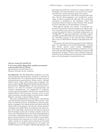 18 citations,
September 2011 in “Livestock science”
18 citations,
September 2011 in “Livestock science” Maternal Nano-Se supplements improve fetal hair follicle development in cashmere goats.
[object Object]  December 2022 in “International journal of preventive, curative & community medicine”
December 2022 in “International journal of preventive, curative & community medicine” PCOS is a common hormonal disorder in women, causing symptoms like acne and irregular periods, and is managed with medication and lifestyle changes.
 9 citations,
March 1968 in “The BMJ”
9 citations,
March 1968 in “The BMJ” A woman's severe skin reaction was caused by an allergy to a skin treatment.
 May 2021 in “Journal of the Endocrine Society”
May 2021 in “Journal of the Endocrine Society” A patient produced cortisol after adrenalectomy, possibly due to residual tissue or other body parts making steroids.
 46 citations,
July 1988 in “Journal of The American Academy of Dermatology”
46 citations,
July 1988 in “Journal of The American Academy of Dermatology” Hormone imbalances can cause specific skin changes, which may help in early detection of endocrine disorders.
 47 citations,
May 2021 in “Polymers”
47 citations,
May 2021 in “Polymers” Jojoba oil is highly valued for its diverse medicinal and industrial uses.
 January 2024 in “JCEM case reports”
January 2024 in “JCEM case reports” This is the first known case of parathyroid cancer in a patient with Birt Hogg Dube Syndrome.
[object Object]  32 citations,
March 2021 in “Journal of endocrinological investigation”
32 citations,
March 2021 in “Journal of endocrinological investigation” Thyroid hormones are important for skin health and changes in them can affect conditions like hair loss and eczema.
 April 2006 in “Current Opinion in Endocrinology & Diabetes”
April 2006 in “Current Opinion in Endocrinology & Diabetes” Testosterone therapy can help improve sexual function, mood, and bone density in women with low androgen levels, but more research is needed on long-term safety.
 10 citations,
April 2006 in “Seminars in Reproductive Medicine”
10 citations,
April 2006 in “Seminars in Reproductive Medicine” Testosterone therapy may improve mood, well-being, and sexual function in premenopausal women, but more research is needed on its long-term safety and effectiveness.
 1 citations,
November 2016 in “Congenital Anomalies”
1 citations,
November 2016 in “Congenital Anomalies” Get head MRI for babies with achondroplasia early, use free immunoglobulin light chains to detect certain neurodevelopmental disorders, and video calls work for speech therapy in patients with facial anomalies.
August 2024 in “International Journal of Molecular Sciences” Mesenchymal Stem Cell therapy shows promise for treating hair loss in Alopecia Areata.
 5 citations,
January 2012 in “International journal of trichology”
5 citations,
January 2012 in “International journal of trichology” A 2-year-old boy had no hair and unusual organ placement, and it's unclear if it's genetic or coincidental.
 4 citations,
October 2019 in “Case Reports”
4 citations,
October 2019 in “Case Reports” A 33-year-old woman with PCOS and metabolic syndrome was unusually diagnosed with a bone condition called DISH, suggesting a possible link between these conditions.
 3 citations,
January 2019 in “Elsevier eBooks”
3 citations,
January 2019 in “Elsevier eBooks” Pharmacists should interpret lab data and perform physical exams to improve patient care.
 October 2020 in “Veterinary Dermatology”
October 2020 in “Veterinary Dermatology” New treatments and diagnostic methods for various animal skin conditions showed promising results.
Different types of sun exposure damage skin cells and immune cells, with chronic exposure leading to more severe and lasting damage.
28 citations,
June 2021 in “Frontiers in immunology” A protein called lfTSLP is important in causing allergic and other skin diseases and could be a target for treatment.
 January 2019 in “Oncogen”
January 2019 in “Oncogen” Triple Hormonal Blockade (ADT3) can effectively manage prostate cancer but requires careful monitoring for heart risks.
 November 2014 in “John Wiley & Sons, Ltd eBooks”
November 2014 in “John Wiley & Sons, Ltd eBooks” Eating high-glycemic and dairy foods can increase hormones that may cause acne and other health issues.
 April 2024 in “Research Square (Research Square)”
April 2024 in “Research Square (Research Square)” A 27-year-old with APS-1 showed improvement in symptoms after treatment.
 20 citations,
December 2013 in “Journal of Dermatology”
20 citations,
December 2013 in “Journal of Dermatology” UV-B light increases inflammation-related substances in acne-related skin cells.
 8 citations,
October 1989 in “International Journal of Dermatology”
8 citations,
October 1989 in “International Journal of Dermatology” Cytochrome P-450 enzymes in the skin help break down various substances and could be targeted to treat skin conditions.
6 citations,
April 2010 in “Arthritis Care & Research” Antituberculous drugs improved symptoms in a woman with lupus and myositis.
 January 2019 in “ARC journal of pharmaceutical sciences”
January 2019 in “ARC journal of pharmaceutical sciences” Acne can be managed with various treatments and requires psychological support due to its emotional impact.

Onabotulinumtoxin-A effectively treated a painful scalp condition when other treatments failed.
514 citations,
February 2011 in “International journal of women's health” Different treatments for PCOS focus on the specific symptoms, with weight loss and lifestyle changes being important.
 13 citations,
June 2020 in “BMC genomics”
13 citations,
June 2020 in “BMC genomics” A specific microRNA, chi-miR-30b-5p, slows down the growth of hair-related cells by affecting the CaMKIIδ gene in cashmere goats.
 11 citations,
January 2000 in “Journal of Cutaneous Pathology”
11 citations,
January 2000 in “Journal of Cutaneous Pathology” Short telomeres contribute to aging and cancer, and while telomerase can delay aging, it may also promote cancer.
 May 2024 in “KIU journal of health science”
May 2024 in “KIU journal of health science” Kolaviron and quercetin may help treat prostate issues.

























